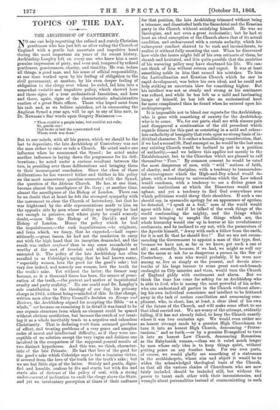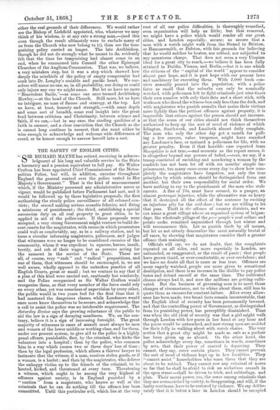TOPICS OF THE DAY.
THE ARCHBISHOP OF CANTERBURY.
No one can help regretting the refined and stately Christian gentleman who has just left us after ruling the Church of England with a gentle but uncertain and impulsive hand during the most important six years of its recent history. Archbishop Longley left on every one who knew him a most genuine impression of piety, and even zeal, tempered by refined gentleness, graciousness, charity, and timidity. He was, before all things, a good man, and his sense of official responsibility, at one time worked upon by his feeling of obligation to the civil government, at another, by his even deeper feeling of obligation to the clergy over whom he ruled, led him into a somewhat variable and impulsive policy, which showed here and there signs of a true ecclesiastical fanaticism, and here and there, again, signs of the characteristic administrative caution of a great State officer. Those who hoped most from his rash and, as we believe mistaken, act in summoning the Anglican Synod a year ago, will be apt to say of him now, in Dr. Newman's fine words upon Gregory Nazianzen :— " Thou could'st a people raise, but could'st not rule; So, gentle one !
God broke at last the consecrated tool Whose work was done."
But to our minds, with all his graces, which we should be the last to depreciate, the late Archbishop of Canterbury was not the man either to raise or rule a Church. He acted under one influence when he summoned the Synod ; he acted under another influence in laying down the programme for its deli- berations; he acted under a curious resultant between the two, in presiding over those deliberations and bringing them to their inconsequent conclusion. Since the close of those deliberations he has wavered hither and thither in his policy on the most momentous question connected with the Synod, the question of the African Church. He has, at one time, become almost the mouthpiece of Dr. Gray ; at another time, almost the mouthpiece of the Bishop of London. There can be no doubt that at heart he felt the strongest sympathy with the movement to clear the Church of heterodoxy, but that he was frightened by the able representations made to him on the opposite side by men whose ability and integrity he had wit enough to perceive, and whose piety he could scarcely doubt,—men like the Bishop of St. David's and the Bishop of London. Hence the policy which he had the impulsiveness,—the rash impulsiveness,.—to originate, and from which, we fancy, that he expected,—half super- stitiously,—great issues, he bad not the resolution to carry out with the high hand that its inception demanded, and the result was rather ctnyitsed than in any sense remarkable or worthy of the sort of feverish zeal which designed and executed it. The policy of the late Archbishop has often recalled to us Coleridge's saying, that he had known many, "especially women, love the good for the good's sake ; but very few indeed, and scarcely one woman, love the truth for the truth's sake. Yet without the latter, the former may become, as it a thousand times has been, the source of perse- cution of the truth,—the pretext and motive of inquisitorial cruelty and party zealotry." No one could read Dr. Longley's sole contribution to the theology of our day, his primary charge in 1864, without being reminded of this. In that charge, written soon after the Privy Council's decision on Essays and Reviews, the Archbishop argued for accepting the Bible "as a whole," not because on examining it in detail it was found to be one organic structure from which no element could be spared without obvious mutilation, but because the result of not treat- ing it as a whole inevitably tends to a negative and colourless Christianity. That is deducing truth from assumed goodness of effect, and treating problems of a very grave and complex order of moral and intellectual difficulty, as if they were sus- ceptible of no solution except the very vague and dubious one involved in the comparison of the supposed general results of two distinct hypotheses. And this was, we think, character- istic of the late Primate. He had that love of the good for the good's sake which Coleridge says is but a feminine virtue, if severed from the love of the truth for the truth's sake ; but we see but little sign of the latter. Stately and gentle, digni- fied and humble, zealous by fits and starts, but with fits and starts also of distrust of the policy of zeal, with a strong under-current of inclination to exalt the clergy above the State, and yet an involuntary perception at times of their unfitness for that position, the late Archbishop trimmed without being. a trimmer, and dissatisfied both the Sacerdotal and the Erastian party in the Church without satisfying himself. He was no theologian, and not even a great ecclesiastic ; but he had at least an ideal conception of the Church above that of its actual condition, and endeavoured with a certain audacity, which his subsequent conduct showed to be rash and inconsiderate, to realize it without fully counting the cost. When he discovered how wide the issues might fall of his own estimate of them, he shrank and hesitated, and it is quite possible that the anxieties. of his wavering policy may have shortened his life. We can- not think of him without esteem and regret. It was at least something noble in him that caused his mistakes. To him the Latitudinarian and Erastian Church which he saw int rapid development, was below his own ideal, and he could not help striking an uncertain blow for something higher. But. his intellect was not as steady and strong as his sentiment. was refined, and while he has left us a mild and fascinating image of himself, he has left also an ecclesiastical knot. far more complicated than he found when he entered upon his archiepiscopate.
It is impossible not to blend our regrets for the Archbishop, who is gone with something of anxiety for the Archbishop. who is to come. We, for our parts, shall see with sincere pain and disapproval a continuation of the old precedent which_ regards fitness for this post as consisting in a mild and colour- less catholicity of benignity that rests upon no strong basis of in- dividual character. It is rather a humiliating consideration, that, if we had a second St. Paul amongst us, he would be the last man any existing Church would be inclined to put in a position_ of authority,—and we believe this applies not merely to the Establishment, but to the Churches which are pleased to call themselves "Free." By common consent he would be voted the most dangerous of men, with " wild " notions of faith, of charity, and of discipline, with a tendency to transcenden- tal extravagance which the High-and-Dry school would de- plore, with a tendency to universalism which the Low school would condemn, with a tendency to see a divine grace in secular institutions at which the Dissenters would stand aghast, and yet a tendency to find God everywhere over which politicians would shrug their shoulders. If such a one should say, in spasmodic apology for an appearance of egotism he detested, "I speak as a fool," men of the world would. agree with him ; and if he talked of the weak things of the world confounding the mighty, and the things which. are not bringing to naught the things which are, the whole hierarchy would rise up in horror at his revolutionary sentiments, and be inclined to cry out, with the persecutors of the Apostle himself, "Away with such a fellow from the earth, for it is not fit that he should live !" But we are not recom- mending the Government to appoint a man of this type, first, because we have not, as far as we know, got such a one at all ; and, secondly, because, if we had, we might as well cry for the moon as ask for so dangerous a person in the See of Canterbury. A man who would probably, if he were now- among us, live as simply as the poorest, and devote nine- tenths of his large income to some great root-and-branch onslaught on City miseries and vices, would turn the Church of England giddy with excitement and alarm. But we think the time has come for asking for an Archbishop who- is able to lead, who is among the most powerful of his order, who can understand all parties in the Church without allow- ing his own individual conscience and intellect to be frittered away in the task of useless conciliation and unmeaning com- pliment, who, in short, has, at least, a clear ideal of his own of the future of the Church, and will make some effort to see that ideal carried out. We are weary of the attempt, evidently failing, if it has not already failed, to keep the Church exactly where it was two centuries ago. We would even rather see an honest attempt made by a genuine High Churchman to turn it into an honest High Church, denouncing "Protes- tantism," and so forth,—or by a genuine Evangelical to turn it into an honest Low Church, denouncing Romanism as the Babylonish woman,—than see it ruled much longer by men whose only idea is to keep things quiet, without putting peace on any franker basis. For our own parts, of course, we would gladly see something of a statesman in the archbishopric, whose aim and object it would be to widen the acknowledged theological basis of the Church, so that all the various shades of Churchmen who are now fairly included should be included still, but without the power to taunt each other with their inconsistencies, and wrangle about personalities instead of communicating to each other the real grounds of their differences. We would rather see the Bishop of Lichfield appointed, who, whatever we may -think of his wisdom, is at any rate a strong tuan,—(and this even though the result ultimately were to exclude many of us from the Church who now belong to it), than see the tem- porizing policy carried on longer. The late Archbishop, -though he did not do strongly what he meant to do, evidently felt that the time for temporizing had almost come to an end, when he summoned into Council the other Episcopal Churches of the Anglican Communion. That was, we believe, a very mistaken step, but it was a step which showed how deeply the mischiefs of the policy of empty compromise had sunk into Dr. Longley's amiable and pacific heart. We our- selves will name no one, as, in all probability, our doing so could only injure any one we might name. But let us have no more
Benevolent Smile,"—as some one once termed Archbishop Hawley,—at the head of the Church. Still more, let us have no intriguer, no man of finesse and strategy, at the top. Let us have, at least, honesty and strength,—with some depth and some sort of breadth, some real insight into the great feud between criticism and Christianity, between science and faith, if we can,—but in any case, the sterling qualities of a faith in earnest, and a clear conviction that the Church as she is cannot long continue in earnest, that she must either be wise enough to acknowledge and welcome wide differences of creed, or be honest enough to narrow herself into a sect.































 Previous page
Previous page